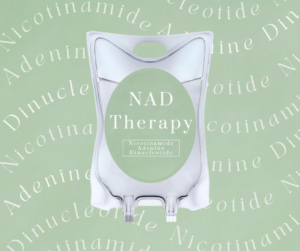
Nicotinamide Adenine Dinucleotide is a chemical found all within our body inside our cells. Despite this, you probably haven’t heard of this important chemical and the effects it has on your wellbeing.
NAD deficiency is a common occurrence within the general population and is linked to many diseases like diabetes and heart disease. Whatsmore NAD deficiency has been linked to poorly aging, and early cell death.
Here we provide a complete guide on Nicotinamide Adenine Dinucleotide, explaining everything you need to know to ensure that your NAD levels are at their peak, so you can continue to feel your best.
What Is Nicotinamide Adenine Dinucleotide?
A key player within the metabolism of our cells, Nicotinamide Adenine Dinucleotide is a crucial coenzyme that carries electrons to and from chemical reactions. This allows our cells to create energy, that powers our whole body.
NAD gets formed from niacinamide which is a form of vitamin B3. When niacinamide combines with the nucleotide adenine, this creates Nicotinamide Adenine Dinucleotides.
The primary form of NAD within the body is NAD+ or NADH. NADH is the form used to move electrons. Its positive charge allows it to easily accept a free electron within the citric acid cycle. NADH also works with CoQ10 to create ATP, the form of energy used within cells.
In humans and animals, NAD gets synthesized from the amino acid tryptophan. The main production of NAD however comes from recycling nicotinamide to create more NAD within cells.
What Role does NAD Play In Your Body?
NAD and therefore NADH have critical roles in the body. NADH gets released from various parts of the body in order to help regulate homeostasis.
Homeostasis is the process of your body trying to maintain equilibrium as it encounters the stressors that life presents.
NAD also plays an important role in the communication between organs and cells.
Within the brain, NADH works as a sort of neurotransmitter that gets released by neurons as well as nerves that communicate to smooth muscle within the autonomic nervous system.
NAD also works as an adaptogen, meaning that it helps maintain balance and health within your body when stressful events occur. Additionally NADH has been shown to play a role in helping to prevent or undo neurodegeneration within the brain.
How Does NAD Affect You?
NAD has become known as a regulator molecule that involves almost every system within your body. It also helps to regulate your circadian rhythm, fight inflammation, and aid your immune system.
When your NAD levels are out of balance your body quickly becomes unable to maintain homeostasis and becomes susceptible to diseases and disorders.
In addition, when NAD levels return to normal with supplements or through diet, it has been shown to help regenerate and repair DNA, areas that have been ravaged by disease.
Supplementing NAD has also been shown to help extend your lifespan by improving your cellular metabolism and extending cell life.
The Effect of NAD As You Age
NAD has been found to be a significant cause of aging and age-related diseases and conditions. As you age, your NAD levels decrease, as your body is able to make less of it. Due to this, your body loses the plasticity that it once had.
This means that your body isn’t able to be as resilient as it once was. This is part of the reason why older people are more at risk for things like cancer, heart problems, diabetes, dementia, and other neurodegenerative diseases.
Leading a healthy lifestyle and eating a balanced diet are ways that you can ensure that your NAD levels don’t decrease prematurely, and thus cause premature aging.
Symptoms of NAD Deficiency
Nicotinamide Adenine Dinucleotide is an integral molecule that allows your cells to create energy. When people have low levels of NAD they often experience symptoms such as brain fog, fatigue, muscle weakness and sometimes can develop degenerative diseases.
When vitamin B3 is low in your diet, your body becomes deficient and unable to create NAD at sufficient levels. When this happens you can develop pellagra.
Pellagra is a common disease in places where food is scarce or the quality of food is poor. Less commonly other disease processes cause pellagra to develop.
Symptoms of NAD deficiency include:
- low energy
- muscle weakness
- diarrhea
- inflamed tissues and mucus membranes
- sores in the skin
- abdominal pain
- trouble thinking
What You Can Do To Boost Your NAD Levels
Because your NAD levels decline with age, eating a balanced diet that contains vitamin B3 naturally can help keep your NAD levels healthy.
Taking NAD supplements has been found to help with not only NAD deficiency but also can help stave off cell death, as well as promote cardiac health, improve chronic fatigue, and lessen fibromyalgia symptoms.
Boosting your NAD levels can help prevent damage to cells and DNA, thus aiding the aging process.
While there are all sorts of supplements that purport to enhance your NAD levels, it’s important to make sure that the supplement you choose is bioavailable and is able to be used by your body in the way you need.
Supplements with NADH or niacinamide are better options than supplements with niacin since this form of B3 can’t readily be used in your body. Supplements that use CoQ10 in conjunction with NADH can be beneficial to your body and can enhance the action of NADH.
Healthy NAD Levels Means A Healthier You!
Keeping your NAD levels at their most optimal will help to keep you feeling your best. Supplementing NADH in your diet can help prevent the effects of aging, and help protect your cells from damage.
We here at The Center for Health & Wellbeing want your to find your healthiest self, which is why when it comes to Nicotinamide Adenine Dinucleotide and other important topics, we have your back!
Click here for more articles about Nicotinamide Adenine Dinucleotide tips and other posts on health and wellbeing.
